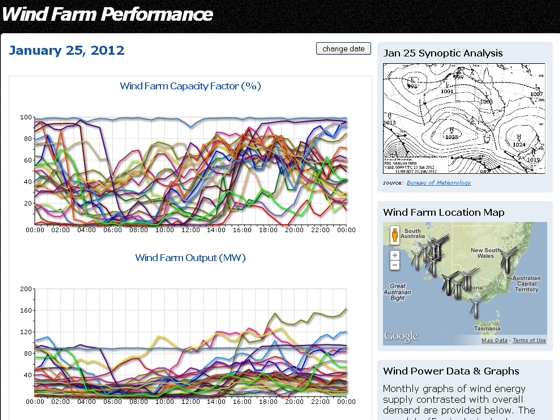It’s Agreed: Teachers Should Teach Environmental Responsibility
Teachers around the world are expected to teacher their students to be responsible citizens, to reduce their impact on the environment and to support sustainability. For one example, see the new Australian Curriculum’s Cross-Curriculum Priority: Sustainability.

Great, good stuff. In fact, it would be difficult to imagine a teacher anywhere who did not believe in protecting the environment for future generations, and teaching today’s students to be responsible adults in the future.
But does mean that we should agree to promote every green cause or environmental suggestion, “just because”. Some ideas are really dumb, including those with a green label applied. How can we tell them apart? Do we just let others decide for us, or do we think for ourselves? I reckon we should use math to check out the facts – and teach our students to do the same.
Will Wind Farms Fix the Energy Crisis?
A lot of environmental activists and politicians are currently promoting wind energy as the solution to global warming and the world’s reliance on dirty fossil-fuel-generated energy. Are they correct?
The answers aren’t all in yet, but it is important to do some basic research, rather than just believing the promoters. There are some great sites out there with lots of information on outputs, days of output, daily averages, hourly averages, etc., which give a much better idea of what is actually happening.
Will wind energy on its own replace other forms of electricity generation?
Other considerations for developing an informed basis for developing an opinion could be factors that are unique to wind farming. Such as:
- Injuries to wildlife, particularly birds and bats – and here. Fact sheet from NWCC.
- Interference with radar signals. Report from The Mitre Corporation.
- Aesthetic concerns
- Noise pollution for local residents
- 100% reliance on moving air (wind), requiring backup power plants
- Need to be shut down during strong winds
- Accidents and safety issues
This is the final podcast episode that was recorded on our trip in Europe. Future episodes will be videoed in the classroom.
Podcast Location:
South Lanarkshire wind farm. You’ll notice that the Google maps photo doesn’t show the wind turbines; the photo must have been taken before they were constructed. If you check the Street View, you will see them.
View Lochhead (Wind) Farm, South Lanarkshire in a larger map
So Where’s the Math?
Teaching about environmental issues is a great opportunity to promote socially responsible outcomes in your students’ lives. It is also a wonderful opportunity to put those mathematics skills to really practical use. Environmental projects always produce controversy, because they always involve costs to someone or other, along with the benefits. In order to reach sensible, informed conclusions, we should return to the data, and ask “What are the facts?”. Your students are ready to answer questions of concern to them, that are matched to their level of maturity. Use math to help them decide!
With your class you could do some activities such as actually planning a family’s daily needs based on the output from turbines on different days. How is industry affected? What is the daily consumption, or even the hourly consumption of power of a city? Are its needs steady or fluctuating? How does this affect the power industry? With these ideas it would be possible to follow through on an idea and make a great math project where the application of math is almost limitless.
The Wind Farm Performance site has lots of real-time stats and graphs on Wind Farms:

What do you teach in environmental studies that could use some reality in the form of data? I’d love to hear your ideas – please leave a comment below.
Related Videos
Explanation of the components of a wind turbine:
Turning the Weather Into Power (article + Flash animation) – click image for link:
Danish wind turbine fails in storm:
Wind energy in west Texas, Wind Turbines:
Wind Farms in the Media This Week:
- The Australian, Jan 25 2012: “What You Can’t Hear Can Hurt You“
- The Sunday Express, Jan 22 2012: “MPs’ Bid to Halt Hot Air Chris Huhne’s Wind Farms“
- The Boston Globe, Jan 24 2012: “Wind Turbines an Annoyance, not a Hazard“
- Top News Arab Emirates, Jan 25 2012: “Wind Farms Will Hardly Hamper Your Health“
- ABC Sydney, Jan 24 2012: “Green Group Wound up by NSW Wind Farm Rules“
Photo Credit
Children Recycling: © iStockphoto.com/Randy Plett

A refreshing perspective for real life math applications. Appreciate the sharing. Peace.
Thanks for the comment. I think that real life applications are a must for teaching math, otherwise we’re just giving our students generic skills, that often can be gotten quicker from a calculator.
But if we can show students how what they are learning helps them solve real problems (even in the future), that should have more motivating force for them. Appreciate you stopping by and commenting!
This was one of the most well rounded pieces I’ve seen on the different sides of wind energy. I really appreciate that you included the other considerations which can sometimes be the negative side to implementing wind energy. I’ve really been trying to dig in and figure out whether noise pollution is a serious case against wind turbines or not. In my research I have found something called wind turbine syndrome. In looking at the facts it’s really tough to see how the sounds are actually carrying all the way to residents. The height and distance of turbines seems to dissipate the sound. With that said it seems there is some type of vibration or pressure in the air that continues to persist for residents, have you found any hard data on this?
One of the things that stood out the most to me was the excellent real-time stats on Wind Farm Performance. Wow! It’s pretty incredible to see the cyclical nature of wind energy creation.
Thanks again for the great collection of information. This is a great way to get people introduced to wind energy.
Thanks for the thoughtful comment, Joel!
I don’t have data on noise pollution, though of course it is well known that this is one objection people who live near wind farms complain of. Another which I didn’t mention in the video is the spoiling of the natural beauty where turbines are situated. I don’t think that would be much of an issue where I filmed this video, but certainly is in other places.
My view hasn’t changed since I made the video 12 months ago; if anything I feel even more strongly that wind farms need to be very carefully thought out, due to the long list of potential problems they introduce, and the lack of solid evidence that they will save money or the environment.
These are all questions that should be included in a lesson about power generation, rather than presenting “green” sources of energy as unchallenged, completely good ideas.
Great to hear your views, thanks again for commenting.